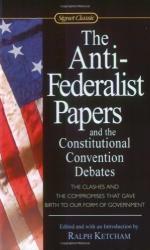
|
| Name: _________________________ | Period: ___________________ |
This test consists of 15 multiple choice questions and 5 short answer questions.
Multiple Choice Questions
1. What did the draft of the Constitution contain concerning slavery?
(a) The draft outlawed the domestic slave trade.
(b) The draft outlawed the importation of slaves.
(c) The draft prevented a tax or prohibition on slavery.
(d) The draft did not mention slavery explicitly.
2. How did James Wilson address the absence of a Bill of Rights?
(a) He told his audience that it was unnecessary because certain rights were inalienable.
(b) He told his audience that a bill of rights would require some trial and error, and therefore time.
(c) He reminded his audience that the government only had the rights enumerated in the Constitution.
(d) He told his audience that there had not been enough time to write a bill of rights.
3. What did Madison advocate concerning the election or appointment of the executive?
(a) Appointment by an electoral college would be best.
(b) Appointment by the Supreme Court would be best.
(c) Election by the people would hurt the public interest.
(d) Election by Congress would hurt the public interest.
4. How extensive were the changes the delegates made to the first draft of the Constitution?
(a) The draft was almost entirely rewritten.
(b) Not extensive at all.
(c) Revisions gave the Congress veto power over presidential appointments.
(d) Revisions separated the branches of government.
5. What was Mr. Mason's fear about the Constitution as it was then drafted?
(a) He feared that his constituents would not ratify the draft.
(b) He objected to the three-fifths compromise.
(c) He feared that Congress did not have enough power to check the executive.
(d) He wanted a bill of rights.
6. What did "Publius" argue regarding the fear of a centralized government?
(a) He argued that a centralized government would distribute the wealth more effectively.
(b) He argued that a central government would be more efficient than a number of state governments.
(c) He argued that checks and balances would lead to government paralysis.
(d) He argued that large nations are less dangerous than quarrelling small states.
7. What did the Pennsylvania dissenters recommend to the Constitutional Convention?
(a) Limitations on the expansion of the United States.
(b) A standing army that would still exist in peacetime.
(c) Trial by jury in all federal cases.
(d) Trial by jury in property conflicts.
8. What did "Federal Farmer" complain about in his second letter?
(a) The Supreme Court had too much power.
(b) The government was allowed to do anything it felt necessary to govern.
(c) The government could impose too many taxes.
(d) That there is no bill of rights.
9. Which party did James Wilson belong to?
(a) Anti-Federalist.
(b) Whig.
(c) Tory.
(d) Federalist.
10. What did the convention call for on July 26?
(a) A committee to write a draft of the agreed-upon points.
(b) A committee to resolve the Virginia Plan and the New Jersey plan.
(c) A vote on ratification.
(d) Proposals for executive term limits.
11. What compromise did Mr. Gerry want to reject regarding the ratification of the Constitution?
(a) The three-fifths compromise.
(b) The compromise over slavery.
(c) The Missouri Compromise.
(d) The Great Compromise.
12. What did Rhode Island propose to ban?
(a) Restrictions on inter-state trade.
(b) Standing armies in peacetime.
(c) Checks and balances.
(d) Political contributions from businesses.
13. What did "Federal Farmer" argue regarding the separation of powers?
(a) That it would slow the government's response to events.
(b) That it would encourage lawsuits.
(c) That it would hide government corruption.
(d) That it was disconnected from the popular will.
14. What did Massachusetts propose in its ratification process?
(a) Restrictions on taxation power.
(b) Restrictions on alcohol sales.
(c) Freedom of speech.
(d) Restrictions on the standing army.
15. Which delegate expressed his regrets about not signing the Constitution?
(a) Mr. Gerry.
(b) Mr. Mason.
(c) Mr. Williamson.
(d) Mr. Hamilton.
Short Answer Questions
1. What were supporters of the residency requirement for citizenship afraid of?
2. What imbalance gave James Madison cause for worry about ratification in the states?
3. What was the Pennsylvania dissenters' primary objection to the Constitution?
4. What did Mr. Sherman advocate about executive veto power?
5. What did "Brutus" say was the danger of a standing army?
|
This section contains 809 words (approx. 3 pages at 300 words per page) |

|




